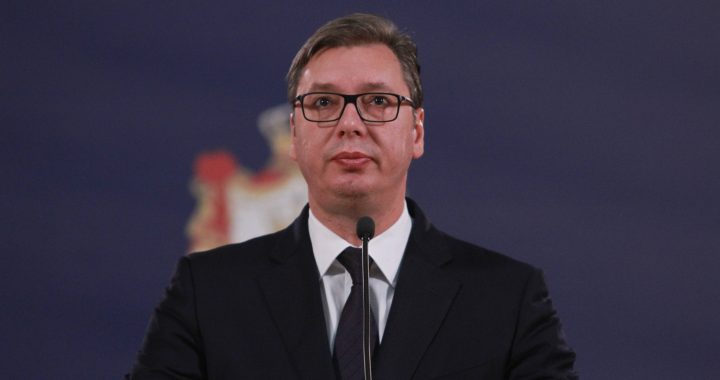

 Beograd, 7.08.2018. - Predsednik Srbije Aleksandar Vucic govori na konferenciji za novinare, danas u Predsednistvu Srbije u Beogradu. (BETAPHOTO/MILOS MISKOV/DS)
Beograd, 7.08.2018. - Predsednik Srbije Aleksandar Vucic govori na konferenciji za novinare, danas u Predsednistvu Srbije u Beogradu. (BETAPHOTO/MILOS MISKOV/DS)
Serbian President says Belgrade will continue to fund Kosovo Serbs in dinars, after Kosovo enforced a euro-only policy for cash payments – and was sending them February's payments in advance.
Serbian President Aleksandar Vucic said on Friday that Serbia will continue to fund Kosovo Serbs – in public-sector salaries, social help and pensions – in dinars, despite the Kosovo government’s enforcement of a euro-only policy for cash payments that started Thursday.
“We have today sent in advance salaries, pensions and social aid for our people in Kosovo and Metohija, long before it was time for the February payments,“ Vucic said at a press conference, stressing that almost a third of the money has been sent already.
From Monday, deliveries will continue through a licensed carrier, which is “the British company Henderson“, he added.
“Serbs in Kosovo have to know that the country will do anything so they can receive their payments,“ the President said, adding that he did not want to publicly disclose technical details. “I wouldn’t like to introduce you to the technical details because it doesn’t occur to me to tell those who are persecuting Serbs and carrying out ethnic cleansing what we have prepared and all of what we can do,“ he continued.
He also said Serbia will submit a request for an emergency session of the UN Security Council on Monday, and had already sent a letter to the representatives of EU member states, EU institutions, as well as the presidents and prime ministers of all members of the Security Council, including Russia and China, “who we informed in internal consultations how concerned we are“.
Kosovo’s Deputy Prime Minister, Besnik Bislimi, said on Wednesday that a regulation enforcing a euro-only policy for cash payments will enter into force as planned on February 1, while announcing a transition period for Serbs in Kosovo who still use Serbia’s currency, the dinar, amid pressures from the EU and US.
Bislimi did not specify how long this transition period will last, while playing down claims that the policy would burden thousands of Kosovo Serbs who get pensions from Serbia.
Bislimi said that, during the undefined transitional period, no one will be punished for using Serbian dinars and money flows from Serbia will not be banned. To ensure continuation of Serbia’s “donations” to Kosovo Serbs, the Kosovo government has asked the Kosovo Central Bank to establish contact with Serbia’s Central Bank.
The National Bank of Serbia on Thursday told the daily Danas on Thursday there was no possibility of that kind of contact, and that any agreement between the two banks must be resolved within the official dialogue between Belgrade and Pristina.
The European Commission spokesperson Eric Mamer said on Friday that Brusssels was concerned about Kosovo’s decision to abolish the dinar and is asking for the transition period to be long enough to find a solution within the dialogue led by the EU.
“The Commission regrets that this decision was adopted without prior consultation, considering the impact of this decision on the daily life of Kosovo Serbs and other communities throughout Kosovo,” Mamer said.
The US State Department said the the US was also disappointed and opposes Kosovo’s plans to restrict the import of foreign currencies, including the dinar. In a written response to Voice of America on Thursday it said: “The consequence of such and similar unilateral moves limits the options of America, which acts as a representative of Kosovo in the international arena.”
02 February 2024 - 20:02

Kosovo PM Albin Kurti first came to power in a landslide win in 2021, ...

In Kosovo’s public discourse, early pregnancies are frequently portr...

A significant portion of the information consumed by the citizens of K...

Former intelligence agency chief Driton Gashi was sentenced to four ye...